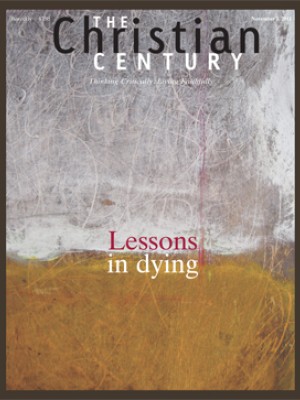Sunday, November 6, 2011: Matthew 25:1-13
God grants astonishing freedom to creatures who bear the imago dei. The Arab Spring is only the latest evidence of the human desire for freedom. What's more, and far more awkward in a culture of autonomous freedom like ours, is that the God who gives us freedom also holds us accountable for what we do with this gift.
I love being free. I especially love autonomous freedom—the delight of pursuing and doing what I want. As a person of privilege, I can use this freedom to bless or to curse. At times I use it for something that gives life, but at other times I use if for something that diminishes or even squanders life. I can make decisions that waste the hours others need just to find and carry water to their families. If I'm out for a walk, my discretionary income allows me to buy a latte or a shirt just because I want one; my family will still eat and have shelter. As a pastor, I may use leadership to get my way just because I am trusted and given freedom of expression.
Read our latest issue or browse back issues.
The problem is that autonomous freedom is near the root of what the Bible calls sin: life autonomous from God, autonomous from others. Remarkably, even though God knows our human instinct for turning the honor of interdependent freedom into the indulgence of autonomous freedom, God does not withdraw our freedom. Instead, God simply holds us accountable.
This tension is central to Matthew's parable. Freedom is implicit in this equal-opportunity parable: ten bridesmaids with ten lamps await the bridegroom. Since many of Jesus' parables involve premises of inequality, this equality parable stands out. Though all ten maidens stand in the same place with the same possibilities, their stories diverge dramatically. Their choices bring consequences.
Five of the maidens were wise and five were fools—this is measured by one criterion: action. It's what they did with their freedom and how they enacted their responsibility that matters. While we are not told why some had oil and some did not, their different choices reveal wisdom and foolishness.
When they heard news of the groom's impending arrival, all of the bridesmaids arose and began to trim their lamps. But only five bridesmaids had brought oil. When the five bridesmaids with no oil asked the other five women if they could borrow some, they were told to go and get the oil themselves. Though it was midnight, the maids went out to find the oil they needed.
This meant that at the moment that really mattered, the foolish maids did not have their minds on the bridegroom but on the oil. This mattered. We may hate this piece of the story, but it's true. The five wise maids went with the groom into the wedding while the other five were shut out because of their foolishness. We may find ourselves sputtering about good intentions, about the five foolish women just being human, about demands of grace. But Jesus ends the story by saying that those shut out were not victims of an officious wedding guardian; it was the groom himself who declared that he did "not know them."
Though all the maids were equally free as they waited, they did not all use their freedom in the same ways. They all had the same opportunity to be in the right place, with the right intention, at the right time, but the readiness was up to them.
We may feel the need to rush in and soften this text, to surround it with wider New Testament themes and to offer assurance that this can't be the final word. This is a legitimate and urgent response. But if we let this text make its point, the parable presses us to search and measure our intentions. Are we preparing for the kingdom? We can choose autonomous freedom, understanding that ultimately there is a severe price, or we can choose to invest our freedom by preparing light to shine when and where it will be needed.
I've married many young men and women who could tell me—even before their wedding day—how their future spouse might abuse freedom and end their marriage. I recently sat with a man who tearfully explained that he'd felt justified in pursuing what mattered to him even as he ignored what mattered to his wife and daughter. "It was a very big mistake," he said in tears. "I was absorbed. I was blind. I lost them." The price can be worse than we imagine. I have seen churches exercise their freedom, get lost in themselves and forget their neighbors. When they belatedly reach out, those around them reply, "Too little, too late." It's the pain of wasted freedom.
The foolish maids failed to have what was essential. In Jesus' teaching, waiting or being ready never seems to be about chronological speculation or theological musings but about how we choose to live. The wise maids chose to act on what they could influence (whether or not they had oil) rather than worry about what they could not determine (the groom's arrival) or presume on others by borrowing.
We begin the story thinking that the mystery is the timing of the bridegroom's arrival, but as the parable unfolds, the central mystery instead is why some maids didn't bring oil. They failed to use their freedom wisely.
What is our freedom for? It's meant to show our readiness in action: to love God with all our heart, mind, soul and strength, and to love our neighbors as ourselves. This is the essence of lamp-ready lives.





